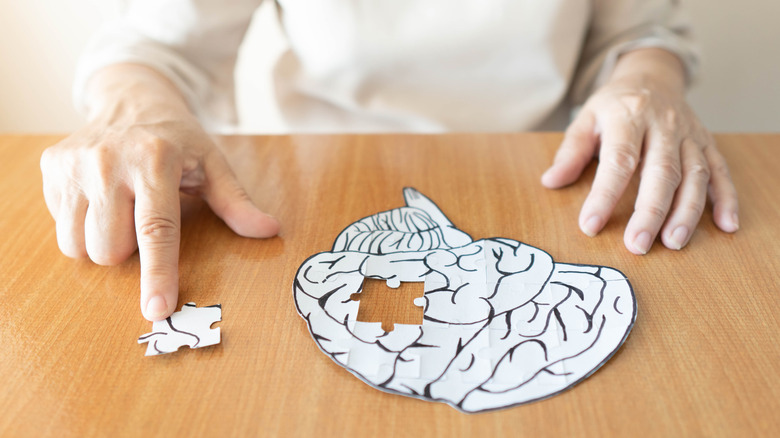The Real Difference Between Alzheimer's Disease And Dementia
For many, it seems as if the terms Alzheimer's and dementia are two sides of the same coin. But those affected by either know the differences all too well. The difference, on its surface, is rather small. But as with all things concerning the mind, small changes can lead to drastic outcomes. And this is even more obvious when you compare dementia to its more specific form, Alzheimer's.
It is this specificity that is the difference between the two. According to the Alzheimer's Association, dementia is a general term that covers any kind of condition later in life that damages memory, thinking skills, or reasoning. Alzheimer's, on the other hand, is a subset of dementia, with specific causes and additional symptoms. Put another way, all Alzheimer's is dementia, but not all dementia is Alzheimer's.
The Association goes on to say that neither is a natural part of the aging process. Contrary to popular belief, dementia is not something that should happen as we age. Rather it is caused by damage to our brain cells that diminish their ability to communicate. This lack of communication ultimately leads to the memory loss and functional issues associated with dementia.
The exact nature of this damage depends on the type of dementia that someone has developed. The Mayo Clinic lists several forms of dementia other than Alzheimer's, including frontotemporal dementia, Lewy body dementia, and mixed dementia, which occurs when someone's dementia stems from a variety of causes.
Diagnostic developments
The AARP explains that, for most of its history, doctors didn't know what caused Alzheimer's. And to a degree, they still don't. Diagnosis used to rely on eliminating other possible causes of dementia and, even after all of that, an accurate diagnosis of Alzheimer's could only be given after an autopsy.
Although the root cause is still unknown, Alzheimer's diagnosis techniques have come a long way in the last decade or so. Patients and their families can now request either a PET scan or cerebrospinal fluid tests to look for the brain plaque and tangles that signify the development of Alzheimer's. These tests offer a 95% accuracy rate, which is far better than previous metrics.
Alzheimer's also differs from most other forms of dementia in the range of possible onset ages. Most dementia develops exclusively later in life. Prior to a person's 60s, at the earliest, memory and thought process issues are typically classified as something other than dementia. Because of Alzheimer's-specific symptoms and markers, however, doctors can identify an early-onset variation that can develop when a person is any age between 30 and 60, according to Dementia.org.
Alzheimer's can be devastating, as can all of the diseases that fall under the broader umbrella of dementia. Researchers continue to search for causes and cures, while current therapies aim to improve the lives of those affected by these diseases.


